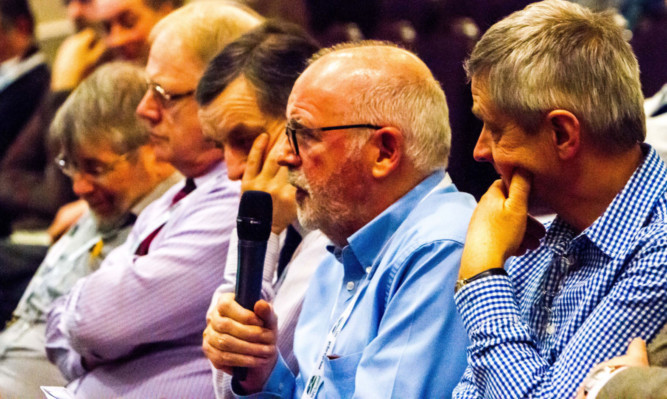At the NFU Scotland annual meeting in St Andrews, the Scottish Government’s Chief Agricultural Officer, David Barnes urged farmers to re-register their businesses as soon as possible.
Failure to do so before the Basic Payment Scheme’s last application date of May 15 could delay payments.
Mr Barnes, who moved only recently from the post of chief agricultural policy adviser, expected around 21,000 businesses to qualify for BPS, with the vast majority being those which received payments from the now defunct Single Farm Payment scheme.
In their case it would be a matter of re-registering. But there would also be an as-yet-unknown number registering for support for the first time.
Although there would be a paper version available, he strongly suggested using the online facility. There had been teething problems but, as of last Friday, 4,930 businesses had submitted applications online, with 3,881 of these sent an official approval.
The advantages of online re-registration would in time include ready access to business information and farm maps.
Asked from the floor by NFUS vice-presidential candidate John Smith whether he could give a cast-iron guarantee that BPS funds would be in farmers’ bank accounts by this December, Mr Barnes said he could not but he was quietly confident.
Two factors could delay payments, although he hoped they wouldn’t.
The first would be the complexity of building a new computer system capable of layering BPS, Less Favoured Area payments, Young Farmers Scheme, agri-environment payments and others.
“Each of those has its own rules, and the computer will have to cross-check these. That would have to be done with or without a computer programme. But we started the IT programme early and gave it first priority,” he said.
The second factor could involve a lack of certainty over allocation of land to the three payment regions. Any lack of clarity in this area would affect everyone’s payments.
On a recent visit to the Rural Payments Agency in Reading this had been identified as a major reason for the failure to make payments timeously in England in 2005 at the start of the SFP regime.
Asked if he had a ‘Plan B’ allowing for a partial payment in December with the balance to follow, Mr Barnes said he had some flexibility but cautioned that, although it sounded attractive, verifications could cause so much extra work and delay that sticking to ‘Plan A’ would likely be a better option.
Regarding the greening rules which have caused so much confusion, Mr Barnes said: “I don’t expect any further changes, but that is not to say that there may be ambiguities which will have to be made clear. We will do that online.”
He urged anyone having difficulty registering or re-registering their business to contact their Scottish Government area office for help.
* Defra Farm Minister George Eustice pointed to a two-pronged approach to boosting markets for dairy products.
The first was by increasing exports to countries like China, which he described as “the big one” , Brazil and Japan.
The second was by strengthening country of origin labelling to give consumers a clearer idea what they were buying.
Retiring NFUS milk convener Gary Mitchell said he felt “physically sick” when he saw dairy products labelled as being of mixed origin, often from Ireland and the UK. “It might be 1% UK for all we know from the label.”
Meanwhile, Mr Eustice said he intended to approach HMRC to ask for understanding of the present position.
Milk production had been profitable until summer 2013 and tax bills due this June might be high.
HMRC should be aware of the cash-flow difficulties which might arise, and should be prepared to offer some flexibility on payments.
